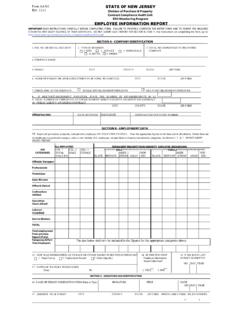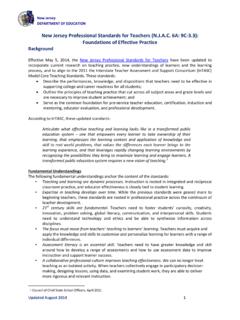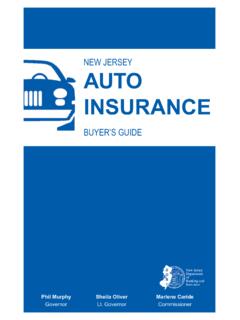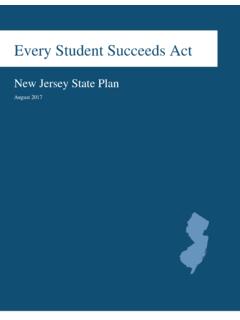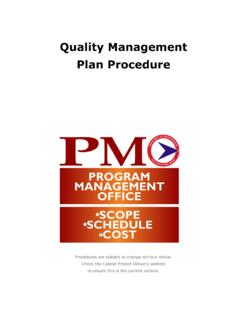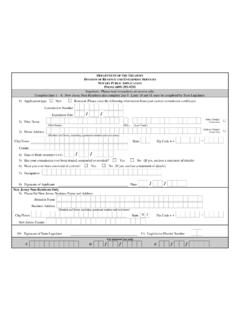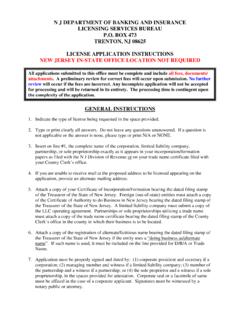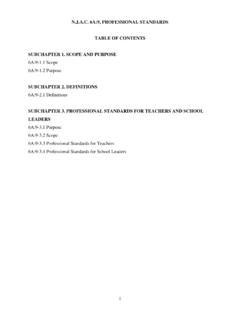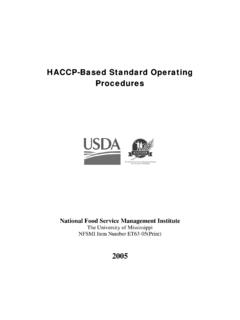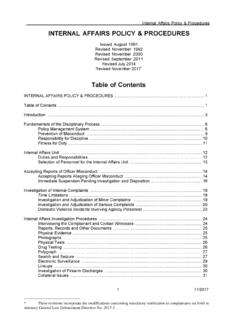Transcription of The New Jersey Medicaid Program and Estate Recovery …
1 Page 1 of 3 The New Jersey Medicaid Program and Estate Recovery What You Should Know What is Estate Recovery ? Under federal and New Jersey law, the Division of Medical Assistance and Health Services (DMAHS) is required to recover funds from the estates of certain deceased Medicaid beneficiaries, or former Medicaid beneficiaries, for all payments provided through the Medicaid Program for services received on or after age 55. This includes, but is not limited to, capitation payments made to any managed care organization, transportation broker, PACE provider, or any other capitated provider, regardless of whether any services were received from an individual or entity that would have been reimbursed by the managed care organization, transportation broker, PACE provider, or other provider that is paid by capitation payments.
2 Why Estate Recovery ? DMAHS pursues Recovery from estates to supplement funds available for medical assistance programs and limit the burden upon taxpayers caused by rising medical costs. Funds recovered help provide assistance to others in need. Who is Affected? The estates of beneficiaries or former beneficiaries who were 55 years of age or older at the time they received services may be affected. What is an Estate ? For Medicaid Estate Recovery purposes, an Estate includes any property that belonged to the deceased at the time of death or at the moment prior to their death. By law, estates include property such as the decedent's home or share of a home, bank accounts (whether solely or jointly held), trusts and annuities, stocks and bonds, and any other real or personal property.
3 It is important to understand that even though the deceased's share of property may pass to survivor(s), it continues to be considered as part of the Estate for New Jersey Medicaid Recovery purposes. Will DMAHS seek Recovery immediately upon death? Yes, if the deceased has no surviving spouse, and has no surviving child under age 21, and no surviving child who is blind or permanently and totally disabled according to Social Security standards at 42 USC 1382c. The only time that Recovery will not be pursued is: I 1. If it would not be cost-effective to do so; or, 2. If property in the Estate is the sole source of income for one or more of the Page 2 of 3 survivors and pursuit of Recovery is likely to result in one or more of those survivors becoming eligible for public assistance and/or Medicaid benefits; or, 3.
4 If a family member of a deceased Medicaid beneficiary has, prior to the beneficiary's death, continuously resided in a home owned by the beneficiary at the time of the beneficiary's death, and that home was the client's primary residence, and was, and remains, the family member's primary residence, DMAHS may record a lien against the property, but will not enforce the lien until the property is voluntarily sold, or the resident family member either dies or vacates the property. When will DMAHS not seek Recovery immediately upon death? DMAHS will not seek Recovery if there is a surviving spouse or a surviving child who is under the age of 21, or is blind or permanently and totally disabled according to Social Security standards at 42 USC 1382c.
5 In that case, repayment would be postponed until: 1. The child reached the age of 21, or, 2. The time of the spouse or child's death. When any of these exceptions to DMAHS' right to recover from an Estate no longer apply ( , as a result of the death of a surviving spouse, attainment of age 21 by a surviving child, and/or Recovery from disability or death of a blind or permanently and totally disabled child), DMAHS has a right to recover from any remaining Estate assets at that time. What should I know about Medicaid liens? Will the Medicaid Program file a lien against my home and property? A Medicaid lien is a claim placed against a deceased person's property to ensure that the Estate pays a debt.
6 When you apply for Medicaid , a lien is not filed against your property. A lien is placed on property after the death of a Medicaid beneficiary or former beneficiary who received services on or after age 55 if there is no surviving spouse, no surviving child under 21 years old, and no surviving child who is blind or totally and permanently disabled. The amount claimed as a lien will be equal to the amount of all Medicaid assistance DMAHS provided for services received on or after age 55, including any capitation payments made to a Medicaid health plan or other entity on the beneficiary's behalf. What about Life Insurance Policies?
7 Proceeds from life insurance policies are considered the assets of the named beneficiaries. Proceeds from whole life policies are subject to Estate Recovery if they are not liquidated prior to death as required. Proceeds from any policy are considered recoverable when the proceeds are paid to the beneficiary's Estate as the named beneficiary or as a default beneficiary including when another named insurance beneficiary predeceases (dies before or at the same time as) the Medicaid beneficiary. What about Annuities? Annuities, which are determined not to be subject to asset liquidation prior to eligibility, must name the State of New Jersey as the remainder beneficiary in the first/primary Page 3 of 3 position for the total amount of medical assistance paid on their behalf at any age.
8 In the case where there is a community spouse and/or a minor or disabled child, the State must be named in the second/secondary position as remainder beneficiary. The State or its eligibility agencies shall require verification of the State being irrevocably named as the remainder beneficiary in the correct position. As the beneficiary of the annuity, the State is paid any remaining income/principal upon the death of the beneficiary per the primary or secondary terms of the annuity contract. What about Burial Policies and Burial Trusts? Under New Jersey law, 1999 Chapter 193, funeral directors and insurers issuing policies covering funeral expenses are required to forward to DMAHS any dollars remaining in a Medicaid beneficiary's irrevocable funeral trust fund or burial insurance policy after reasonable funeral expenses have been paid, but only if the deceased received Medicaid or public assistance benefits.
9 What about Medicare Cost-Sharing Benefits? Effective January 1, 2010, Medicare cost-sharing benefits paid by Medicaid under the Medicare Savings programs are not subject to Estate Recovery . What expenses can be paid with assets of the deceased before paying Medicaid ? Reasonable funeral expenses, reasonable costs and expenses related to the administration of the Estate , and debts owed to the Office of the Public Guardian for Elderly Adults can be paid with the assets of the deceased. DMAHS' claim is next in line, together with debts and taxes with preference under federal or New Jersey law. How will the Estate know money is owed? Those involved in handling the Estate must contact DMAHS in writing as soon as possible after the death of the Medicaid beneficiary or former Medicaid beneficiary.
10 It is their responsibility to notify DMAHS to find out if DMAHS has a claim against the Estate before any funds from the Estate are spent (exception: reasonable funeral expenses may be paid). Distributions to any creditors or heirs cannot be made until the Estate reimburses DMAHS if there is a Medicaid claim. Whoever is handling the Estate should write to: DMAHS Office of Legal and Regulatory Affairs Attn: Estates PO Box 712 - Mail Code #6 Trenton, NJ 08625 If you have any questions regarding Estate Recovery or need more information about Estate Recovery , please call Rev 10/2017
